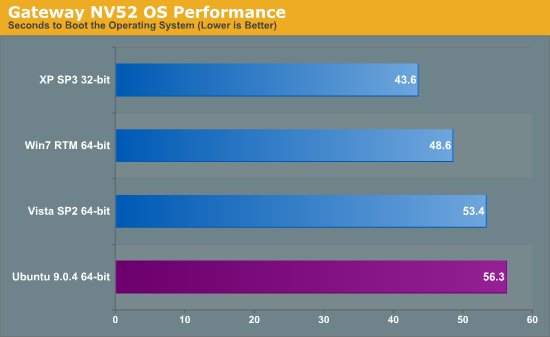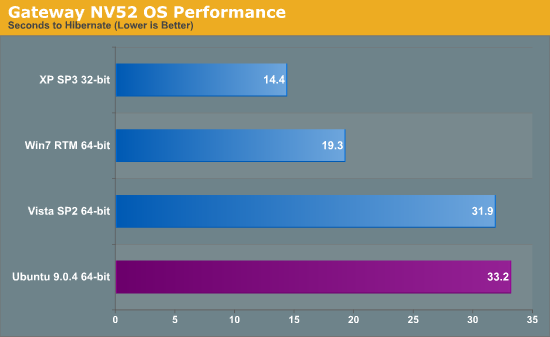Gateway NV52 (AMD) - OS Benchmarks
The final aspect of operating system performance we want to look at involves common OS tasks. We measure how long it takes to perform the routine operations of booting, shutting down, hibernating, resuming, suspending, and waking your computer using the four test operating systems. Unlike other test results, there was a huge degree of variability in some of the tests. We ran each test at least five times, and we took the best result - the reason being that some of the results were completely out of line with the average result, so including one or two results where the system took four times as long it didn't seem logical. Ubuntu and Windows 7 didn't show as much variation as XP and Vista, particularly in the sleep/wake testing, but the hibernate/resume test once again varies quite a bit between test runs.
The variability remained even after following a relatively straightforward test procedure. First we booted each laptop using the test OS (timing how long it took). Then we let the system stabilize for at least 15 minutes, with no extra applications running and the system sitting idle at the desktop. Finally, we performed one of the other tests - shut down, hibernate/resume, or sleep/wake. Obviously, you can't test resume time without first hibernating, and you can't test wake time without first putting the system to sleep, but otherwise we made sure to shut down the system between test runs.
We also need to mention that Windows XP has an inherent advantage in the hibernate/resume testing because we are using a 32-bit OS instead of a 64-bit OS. That means the system doesn't make use of all 4GB of memory, and the hibernation file is 3GB. Writing 3GB of data will obviously be easier than writing 4GB of data, especially when you're dealing with a 5400 RPM laptop hard drive.


The results are rather scattered this time, with certain functions favoring one OS and others looking better on a different OS. Boot times favor Windows XP, followed by Windows 7 which takes 11% longer. Vista trails Windows 7 by 10%, and Ubuntu brings up the rear at 5% longer than Vista. Shutdown times are a different matter, where Ubuntu takes the lead. Vista and Windows 7 are essentially tied, taking 55-60% longer to shut down than Ubuntu. Windows XP brings up the rear this time, at over 2.5 times as long as Ubuntu, although we have to say that this appears to be a driver issue as the result for the NV58 is radically different. When you shut down Windows XP on the NV52, there's a delay of about 15 seconds where there is no apparent activity, after which the hard drive activity light begins blinking. It would seem that without that handicap, Windows XP would be roughly the same as Vista and Windows 7.


As already stated, Windows XP 32-bit has an advantage for the hibernate/resume testing because it doesn't have as much addressable RAM. It ends up walking away with the hibernate/resume performance crown, followed by Windows 7. That said, the time to hibernate in Windows 7 is 34% longer than Windows XP and resume time is 32% longer; Win7 has 33% more memory, so a 32-bit version of Windows 7 ought to be as fast as Windows XP (or a 64-bit XP as slow as Win7). The gap between Windows 7 and Windows Vista is extremely large for hibernation time, with Vista taking 65% longer to hibernate and 46% longer to resume. Ubuntu is almost tied with Vista on the hibernation time, but it takes 50% longer to resume - about twice as long as Win7 - making it by far the slowest OS for this particular test.
We need to take a moment to discuss boot times and resume times, however, as there's more going on than meets the eye. When booting or resuming a system, the computer needs to perform a Power On Self Test (POST). That takes around nine seconds on these Gateway systems, and once that's complete the boot loader is activated which then loads the OS. Ubuntu uses GRUB and that appears to add an extra ~10 seconds relative to Windows. Without that time penalty, Ubuntu would be far more competitive in boot time (about equal to Win7), although it would still be in last place in the resume test. There are also laptops that have a fast boot feature so that they don't perform a lengthy POST, which can shave another 6 or 7 seconds off the boot/resume times. This is definitely a feature we would like to see implemented on more systems going forward, particularly laptops where users routinely boot or resume several times per day.


Wrapping up the OS performance analysis, the sleep/wake times were highly variable on the Windows XP and Vista operating systems. This is especially true if you put the system to sleep right after waking it up, booting, resuming, or any other complex task; in those cases, it might take over a minute to go back to sleep. Ouch! It may also take over 20 seconds for Windows to go to sleep if you have a bunch of applications open - that's about six times as long to put your laptop to sleep, which can be very annoying if you just want to pack up and go. You might think that you can just put your system to sleep and throw it in its bag and walk off, but sometimes a glitch will prevent a laptop from going to sleep so we like to make sure our laptops actually shut off before putting them in an enclosed space. We have heard of a few instances where a laptop has apparently overheated because it didn't go to sleep and a user put it in a laptop bag, resulting in a dead system. That's some food for thought anyway. Ubuntu and Windows 7 did a lot better, with the worst-case result being around twice as long as the best time.
Sleep times are a tie between Ubuntu, XP, and 7 at just under 5 seconds. Vista took noticeably longer even in our best-case result, trailing XP by 59%. Wake times mix things up quite a bit and show a lot less variation between runs, with Ubuntu falling to dead last and Vista and 7 essentially tied at ~3.5 seconds. XP takes 46% longer than Vista to wake and Ubuntu is 55% longer than XP (over twice as long as Win7). Again, though, variability in sleep times makes us prefer Windows 7 and Ubuntu followed by XP, with Vista being the worst at consistently going to sleep without a large delay.










106 Comments
View All Comments
PrinceGaz - Tuesday, September 22, 2009 - link
When surfing on my iTouch, I find that the vast majority of websites display almost the same (complete with images) despite the lack of Flash, and Java as well for that matter (it does at least support JS). There are just the odd undisplayed areas which in most cases are where I know ads would be normally. A very few websites use Flash for navigation and content display without any alternative version of the site available, but the overwhelming majority of sites display fine.That being said, I would prefer to have the option to enable Flash and/or Java if I wished, but would probably leave Flash off most of the time given the likely impact it would have on battery-life and overall responsiveness.
strikeback03 - Tuesday, September 22, 2009 - link
Is there a way to force a mobile version of ESPN that still displays all the links that are flash on the main site?emboss - Tuesday, September 22, 2009 - link
For day-to-day browsing I have flash turned off. Even on Windows it speeds things up, and as a bonus kills most of the ads that try and get around ad blocking. Excluding YouTube videos, I maybe have to enable it once a month or so to use a site that's broken enough to require it.Then again, I use the internet for information rather than entertainment, and things like MSDN don't require flash :)
sc3252 - Tuesday, September 22, 2009 - link
Flash isnt really a part, you can view most sites without it. The only sites that really need it are those crapy sites you really dont want to be at.Another nice point to make is how poorly optimized flash is for GNU/Linux. I am not surprised when using firefox without blocking flash you get such lower battery life since there is almost no acceleration on GNU/Linux. With a 3.2ghz core 2 I can't watch fullscreen flash without skipping and jerking on Debian testing.
pcfxer - Tuesday, September 22, 2009 - link
With my 2.9GHz Athlon X2 5000+ BE, 4GB RAM on PC-BSD 64-bit (with the stock nvidia drivers), I am able to view full screen HD flash without a hint of trouble. This is handled via binary emulation of Linux running Firefox linux with linux flash plugins.Perhaps, anand could test a REAL Unix-like OS and try out PC-BSD. It is MORE "free" than Linux (GPL).
pcfxer - Tuesday, September 22, 2009 - link
I realize that some people may mistake this "REAL Unix-like" for seriousness, it is a joke btw. That said, I am serious about testing PC-BSD - I am a tester for them anyhow ;).